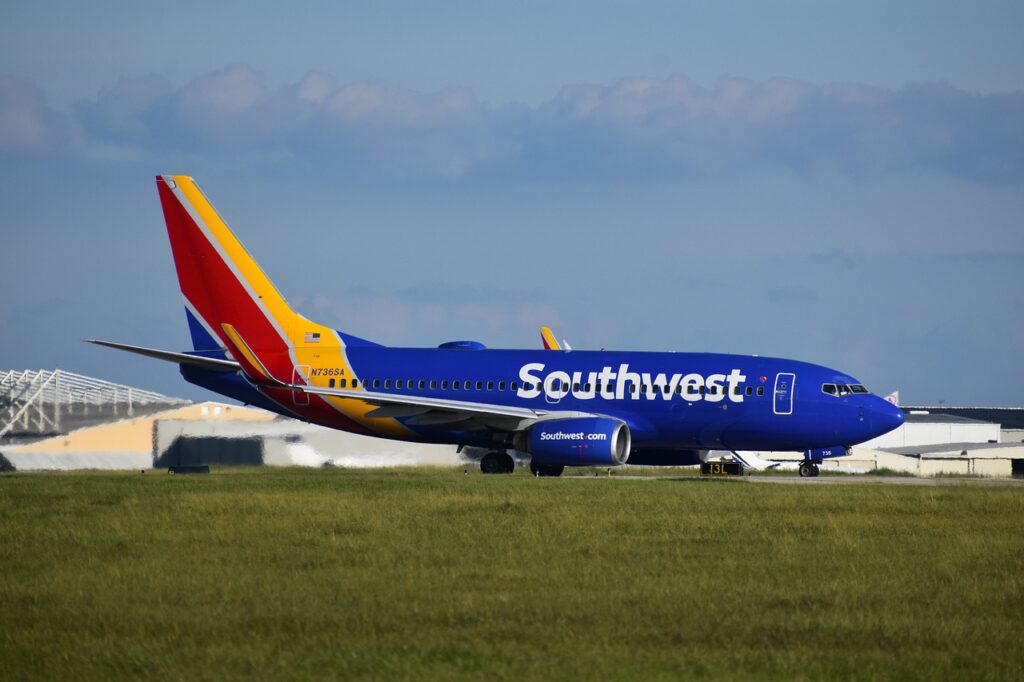
(Rightallegiance.com) – Southwest Airlines, known for pioneering the low-fare, no-frills airline model, announced Thursday that it will end its open-seat boarding policy. This significant shift marks the end of a distinct aspect of its successful five-decade-long business strategy and brand identity.
Move to Assigned Seating
Southwest will transition to assigned seats, departing from its traditional free-for-all seating arrangement. The airline revealed that 80% of its customers prefer assigned seating. Additionally, this change will allow Southwest to introduce new premium seats and charge higher fares for them. This strategic move signifies Southwest’s shift towards aligning more closely with the practices of its competitors. Herb Kelleher, the airline’s founder, famously stated that “conventional wisdom put a hell of a lot of airlines out of business,” highlighting Southwest’s historical focus on differentiation.
Southwest’s Egalitarian Philosophy
The open-seat boarding process has been central to Southwest’s “egalitarian operating philosophy,” which includes policies like no bag fees and the absence of first-class cabins. Founded in 1971, Southwest revolutionized the airline industry with cheap fares, making air travel accessible beyond the wealthiest Americans.
“Southwest open seating is the ultimate expression of its founding ethos: to make air travel affordable and accessible for everyone,” the company states on its website. An unofficial motto once proclaimed, “You can sit anywhere you want — just like at church.”
How Open Seating Worked
For those unfamiliar with Southwest’s boarding process, passengers were assigned one of three boarding groups and positions (1 through 60) at check-in. When their group was called, passengers lined up by number and chose any available seat. This method allowed Southwest to turn planes around quickly, contributing to more on-time departures and cost savings, as CEO Bob Jordan noted during Thursday’s earnings call. The open-boarding policy minimized aisle congestion and provided passengers with the freedom to select less crowded seats.
Despite other airlines adopting assigned seating over the years, Southwest maintained its open-boarding policy. Former CEO Gary Kelly highlighted in 2007 that “Open seating became a very strong brand component with our customers, and something that we wanted to continue to offer them — that freedom of choice.”
Customer Reactions and Concerns
The change has elicited strong reactions from loyal Southwest customers. Many took to social media to express their disappointment. One customer lamented on X, “Being B42 on Southwest Airlines and asking everyone in the area ‘what number are you?’ to make sure B43 isn’t skipping you was an American tradition. Sad day.”
Another customer on Bluesky mentioned preferring open seating to avoid sitting near children, messy seats, or sick passengers. Sandy Wolfe, a frequent Southwest flyer, expressed her sadness over the change, noting that open boarding was a unique aspect of the airline that set it apart. “I have really liked their uniqueness. They weren’t like the other airlines,” she said. “I thought it was an adventure standing in line. I always met great people.” However, Wolfe acknowledged that some customers found the open-seat policy stressful.
Conversely, some customers welcomed the change. One user on X called the open seating “a nightmare if you can’t get to the gate before boarding begins,” citing challenges like traffic and long security lines.
Strategic Business Shift
The move to assigned seating comes at a turbulent time for Southwest. The airline is under pressure from activist investors at Elliott Investment Management, who are advocating for management changes and increased profitability. Despite reporting record revenue, Southwest saw a 51% drop in adjusted profit last quarter. However, CEO Bob Jordan clarified that activist investor pressure did not influence the decision to switch to assigned seating.
Southwest faces intense competition from major carriers like American, United, and Delta, which generate substantial revenue from premium seating fees. Additionally, ultra-low-cost carriers like Spirit and Frontier pose a challenge by offering extremely low fares, though customers must pay extra for many amenities, including carry-on bags.
While Southwest currently has no plans to charge for the first two checked bags, experts like William McGee, a Senior Fellow for aviation and travel at the American Economic Liberties Project, suggest that pressure from activist investors could lead to the introduction of bag fees and other charges to boost profits.
“Southwest is the only airline in the United States that does not charge junk fees for first checked bags, or even second checked bags,” McGee said. “And Southwest has long avoided charging ticket change fees. Elliott’s influence is already being felt, and it seems apparent more junk fees are part of the master plan.”